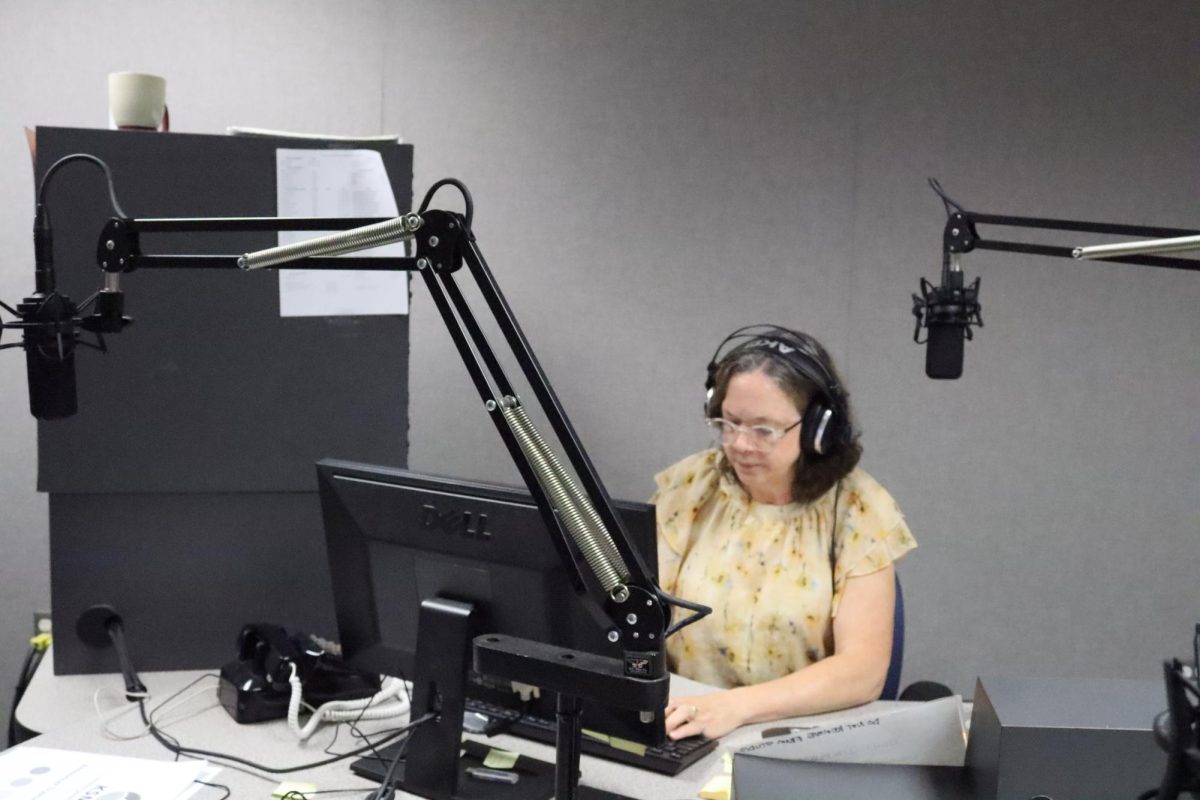With the upcoming presidential election on Tuesday, Nov. 5, it is unclear how civic engagement will change for new voters. Younger generations who have grown up with social media have the chance to bring a new perspective to this election.
Discussions about the quality of news coverage this upcoming election have sparked more questions about its effectiveness.
“News coverage of the 2024 presidential election has been consistently poor,” Dr. Brian Ott, professor of communications at Missouri State University said. “The reasons for this are complex, but two interrelated forces stand out: one, the platformization of news; and two, the economic imperatives of surveillance capitalism.”
Platformization in journalism refers to when digital platforms become the primary source of news coverage. The surveillance economy refers to ways companies collect and use personal data to increase profits. According to Ott, these two factors have led to the blending of false information and truth as news outlets move to online platforms. News stations can then use personal data to recommend specific, targeted stories to viewers. This strategy aims to increase engagement rather than promote unbiased news.
Senior at Nixa High School, Robert Jordan, has a method to try and get around biased news so that he can make an informed decision when voting for the first time.
“I go through many different news articles for a particular topic,” Jordan said. “I try and average out the viewpoints to find out what actually happened.”
From looking at multiple news sources and trying to make a choice, Jordan has been left with a feeling of voter apathy: a lack of engagement with politics.
“I felt like not voting in this election,” Jordan said. “I’m going to vote third party … because of that it does feel like my vote doesn’t matter to some extent.”
Voting can be a powerful tool that enables citizens to influence the direction of their country, which is why Jordan believes voting amplifies people’s voices.
“I’d rather vote and have it not matter than not vote at all,” Jordan said. “Because either way, if it’s not going to matter, you should [still] exercise that right.”
Paws to the Polls, an organization at MSU, aims to increase student civic engagement.
“We’ll go to high schools around the area and we will register students who are 17-and-a-half or older to vote,” senior at MSU Paul Bohlen said. “Greene County allows anybody to go through training and become a Deputy Registrar, which means that they can sign off on [students] registration cards… we’ve had several members of Paws go through that training. So when we go to these high schools, we can actually directly get these students registered immediately.”
Paws to the Polls was created back in 2020 when voter turnout rates were lower. This alarmed Dr. Suzanne Walker-Pacheco, a professor at MSU, and her students, causing them to take action and create the organization.
“In the Fall of 2020, [Paws to the Polls] started tabling places for voter education,” Bohlen said. “They joined with the Office of Public Affairs around that time and got an office in the anthropology department. The League of Women Voters has funded them since.”
Four years later, this organization is still working on growing its influence and providing information for students.
“As of this year, [Paws to the Polls] have taken a lot of steps to grow and sustain the organization,” Bohlen said. “They have also worked on things like building a class specifically on civic engagement.”
As younger generations get older and begin to vote, politicians have begun to shift their campaigns in hopes of appealing to American audiences who have grown up with social media.
“In the 2020 election it cost the two candidates roughly $2 billion,” advanced placement government teacher Alexander Edwards said. “A lot of it was spent on social media research, trying to figure out how you can reach certain demographics of people on social media to influence them in some way.”
Social media has become a key aspect in gaining younger voters. According to a Pew Research study by Brooke Auxier and Monica Anderson, roughly 84% of adults between the ages of 18 to 29 said they use social media.
“Voters who grew up in a digital world have a different relation to politics,” Ott said. “They are much more interested in and influenced by sentiment than in policy. Sentiment is the language of YouTube, TikTok, Instagram, and of digital media broadly.”
One social media tactic that has gained popularity in politics is astroturfing.
“You will create a fake profile or use some type of bot manipulation to make something look really organic,” Edwards said. “You’ll say ‘This candidate stands for these issues and I’m going to vote for them’ even though that person who said that might not be real. It’s a bot account that does it.”
Bot accounts have become common on social media platforms. According to Facebook’s transparency reports, the company took action against 1.2 billion bot accounts between April to June of 2024.
Another method being used to gain younger voters on social media has been creating deep fakes. Deep fakes are images or videos that look realistic but were created by artificial intelligence.
“We saw one of the candidates take a manipulated image of Taylor Swift and say that she was going to vote for him,” Edwards said. “All it takes is you seeing that one time – even though it’s not real – it’s now influenced you to think, ‘Oh, that person supports that candidate.’”
With the shift from campaigning on social media to feelings of voter apathy, Ott has some advice for first-time voters.
“First, please understand that most of the ‘information’ that circulates online is not news,” Ott said. “It has not gone through a rigorous editorial process, and in many cases, it may not even have been created by a human being. Don’t form political beliefs based upon what you read online. Second, talk to people who disagree with you. Talk to them face-to-face and really listen to them and try to understand their point of view. Third, and most importantly, exercise your right to vote.”
Categories:
Campaigns Target Youth
Social media-based election coverage doesn’t always spread truth
October 9, 2024
A survey about news consumption completed by 244 NHS students compared to all Americans over how news is consumed by percentage.
*no data for “Word of mouth” and “Other” for all Americans.
1
More to Discover
About the Contributors

Glennis Woosley, Editor-In-Chief
Senior Glennis Woosley has been editor-in-chief of Wingspan magazine for two years. Over the summer, she went to three summer programs: The School of the New York Times, Missouri Girls State and Medill Northwestern Journalism Institute. Aside from journalism, Glennis competes in speech and debate, where she is the Co-Chair for Nixa’s speech and debate team, FBLA and DECA. She also enjoys playing the bass guitar and following U.S. politics.

Martin Schmalzbauer, Staff Writer
Sophomore Martin Schmalzbauer is a Staff Writer for Wingspan Magazine, where he enjoys covering local and national news. Outside of journalism, Marty enjoys listening to music, catching up with friends and skating.










